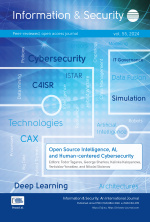Top downloads
| Title | Downloads |
|---|---|
Countering Air Terrorism |
(113) |
The Influence of the Neoconservative Movement on U.S. Foreign Policy |
(135) |
GAO Report on NATO Enlargement: Albania and Croatia |
(91) |
Security Sector Reform |
(103) |
Armenia at a Strategic Crossroads |
(118) |
Strategic Arms Control After START: Issues and Options |
(98) |
Montenegro’s Strategic Priorities on the Path of Euro-Atlantic Integration |
(141) |
Bulgarian Defense Reform from 1990–2008 as a Change Management Process and the Role of Integrity Building |
(107) |
Missile Defense and NATO Security |
(110) |
Corruption in Lithuania |
(95) |
Dynamics of Maritime Terrorist Threats to Russia and the Government’s Response |
(91) |
The Defense Policy of Czechoslovakia and the Czech Republic Since 1989: Stages, Milestones, Challenges, Priorities, and Lessons Learned |
(71) |
NATO Enlargement to Ukraine and Georgia: Old Wine in New Bottles? |
(122) |
Canada in Afganistan: Concepts, Policies, Actors, and Prospects |
(146) |
A Gaming Approach to Enhancing Defense Resource Allocation |
(151) |
Taliban and Jihadist Terrorist Use of Strategic Communication |
(92) |
The Russian Bear: Russian Strategic Culture and What it Implies for the West |
(108) |
Modern Developments in Defense Education |
(47) |
A U.S. Vision of Europe |
(104) |
Memorandum of understanding between the Department of Defense of the United States of America and the Federal Department of Defense, Civil Protection, and Sports of Switzerland Concerning Cooperation in the Development of an Internet-Based Website, to Su |
(39) |
Office of Security Sector Reform (OSSR): Joint Force Command Naples (JFCN) |
(31) |
The Institutionalization of Security Risk Assessment |
(108) |
Endorsement of the Consortium in the report, “Towards a Partnership for the 21st Century - The Enhanced and More Operational Partnership,” Appendix E, Improved Training and Education in the Partnership for Peace |
(39) |
The Expanding Security Agenda: Challenges for Transition States |
(145) |
The Renaissance of Insurgency and Counter-Insurgency:Examining Twenty-First Century Insurgencies and Government Responses |
(102) |
Assessing the Status of PAP-DIB Implementation |
(113) |
Endorsement of the Consortium in the Summit Communiqué, which was issued at the conclusion of the North Atlantic Treaty Organization Summit in Washington, D.C. on 24th April 1999 |
(40) |
Public Diplomacy’s Next Challenge |
(103) |
Report by Swiss Federal Councillor Adolf Ogi on the results of the Consortium's first conference to the EAPC-D in Brussels, Belgium, on 18 December 1998 |
(53) |
Applying a New Management Model in the Joint Staff: An Executive Summary |
(43) |
The Starlink Program: Training for Security Sector Reform in Armenia, Azerbaijan, Georgia, Moldova, and Ukraine |
(121) |
Outside the European Economic and Monetary Union: Consequences for the United Kingdom |
(94) |
Initiation of the Consortium by US Secretary of Defense William Cohen during an intervention at the meeting of the Euro-Atlantic Partnership Council Defence Ministers (EAPC-D) in Brussels, Belgium, on June 12, 1998 |
(43) |
The Divide Over European Security |
(90) |
Whence and Whither the PfP Consortium? |
(98) |
Managing Defense Transformation in Small and Medium-Sized NATO Countries |
(140) |
Beyond the RMA: Survival Strategies for Small Defense Economies |
(100) |
The Military Profession, Public Trust, and Public Interest |
(118) |
NATO Enlargement and Beyond |
(97) |
The PfP Consortium as a Change Management and Integration Tool: Ten Years of Experience |
(70) |
The European Union’s Energy Security Challenges |
(121) |
Solving Transnistria: Any Optimists Left? |
(88) |
The U.S.–Russian Dispute Over Missile Defense |
(49) |
The Challenges of Being Ten: Reflections on the Uniqueness of the PfP Consortium |
(106) |
The Future of Russia: Outlook from the Center and the Regions |
(80) |
NATO and the South Caucasus: Armenia, Azerbaijan, and Georgia on Different Tracks |
(105) |
The Principle of Distinction and Weapon Systems on the Contemporary Battlefield |
(128) |
Building Integrity and Reducing Corruption Risk in Defense Establishments |
(147) |
Energy Security and NATO: Any Role for the Alliance? |
(116) |
The PfP Consortium “Community of Experts” Approach to International Security Cooperation |
(94) |
